

Anxiety disorder. What is the Benefit of the Doubt. How to Stand Up to Anxiety. Metacognitive therapy. Exercises for Stress Reduction & Deep Relaxation - Part 4 of 4 - Deep Conscious Sleep. Advisors help clients tackle the complexities of Social Security. Eva Dion’s 62nd birthday meant one thing to her husband, Jim.

It was time for her to collect Social Security. “I’m from the old school,” Jim, 74, said. “Grab the money while you can.” Yet before Eva made her decision, she mulled it over with her financial advisor, Carolyn McClanahan, the founder of Life Planning Partners in Jacksonville, Florida. McClanahan, a certified financial planner, plugged all of Eva’s details into a software program called SSanalyzer, which runs thousands of claiming strategies and spits out the best options.
The findings didn’t match up with Jim. Ultimately, Eva held back, though McClanahan had to often remind her and Jim that their patience would pay off. Exposure Therapy for Social Anxiety. Forms and Worksheets - Oxford Clinical Psychology. To access forms, worksheets, and handouts, look for the relevant Treatments That Work or Programs That Work title below.

For each title, we have listed direct links to appendices containing free, downloadable forms. Downloadable PDFs will have a PDF icon next to them. For example: Clicking on this will either open the PDF within a compatible browser or download it to your device. Please be sure to save the file onto your device or computer before filling it out. Forms and Worksheets - Oxford Clinical Psychology. Anxiety CBT Worksheets & Handouts.
Assessment Intervention Treatment guidelines.
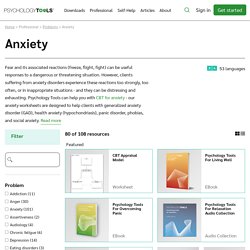
Social Anxiety exposure log. Exposure hierarchy. In exposure therapy, an exposure hierarchy is developed to help clients confront their feared objects and situations in a manner that is systematic and controlled for the purpose of systematic desensitization.
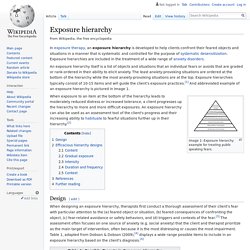
Exposure hierarchies are included in the treatment of a wide range of anxiety disorders. An exposure hierarchy itself is a list of objects and situations that an individual fears or avoids that are graded or rank-ordered in their ability to elicit anxiety. The least anxiety-provoking situations are ordered at the bottom of the hierarchy while the most anxiety-provoking situations are at the top. Social Anxiety Disorder - Anxiety Canada.
Social Anxiety: Imperfect is the New Perfect. By Suma Chand, PhD.
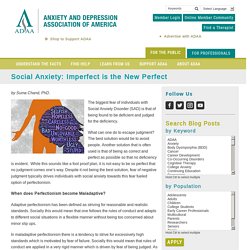
The biggest fear of individuals with Social Anxiety Disorder (SAD) is that of being found to be deficient and judged for the deficiency. What can one do to escape judgment? The best solution would be to avoid people. Decatastrophizing. In cognitive therapy, decatastrophizing or decatastrophization is a cognitive restructuring technique to treat cognitive distortions, such as magnification and catastrophizing, commonly seen in psychological disorders like anxiety[1] and psychosis.[2] The technique consists of confronting the worst-case scenario of a feared event or object, using mental imagery to examine whether the effects of the event or object have been overestimated (magnified or exaggerated) and where the patient's coping skills have been underestimated.
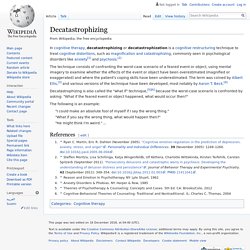
The term was coined by Albert Ellis,[3] and various versions of the technique have been developed, most notably by Aaron T. Beck.[4] Decatastrophizing is also called the "what if" technique,[5][6] because the worst-case scenario is confronted by asking: "What if the feared event or object happened, what would occur then? " The following is an example: "I could make an absolute fool of myself if I say the wrong thing. " "He might think I'm weird. " ... ^ Ryan C. Social Anxiety Self-Help Resources - Information Sheets & Workbooks. Coping with Social Anxiety: This information package is designed to provide you with some information about social anxiety and suggested strategies for how you can manage your anxiety in social situations.
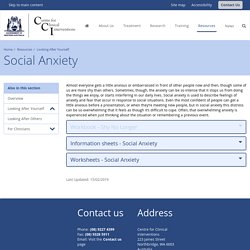
It is organised into modules that are designed to be worked through in sequence. Although it is not necessary that you complete one module before going on to the next, this is recommended. Each module includes information, worksheets, and suggested exercises or activities. Schema therapy. Schema therapy was developed by Jeffrey E.
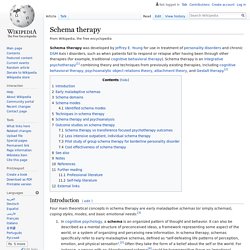
Young for use in treatment of personality disorders and chronic DSM Axis I disorders, such as when patients fail to respond or relapse after having been through other therapies (for example, traditional cognitive behavioral therapy). Schema therapy is an integrative psychotherapy[1] combining theory and techniques from previously existing therapies, including cognitive behavioral therapy, psychoanalytic object relations theory, attachment theory, and Gestalt therapy.[2] Introduction[edit] Differences between Social Anxiety and Panic Disorder. The distinction between social anxiety and panic disorder is probably the most misunderstood subject concerning the anxiety disorders.
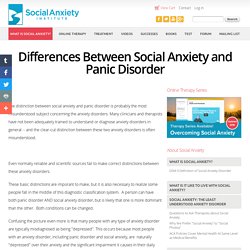
Many clinicians and therapists have not been adequately trained to understand or diagnose anxiety disorders in general -- and the clear-cut distinction between these two anxiety disorders is often misunderstood. Even normally reliable and scientific sources fail to make correct distinctions between these anxiety disorders. These basic distinctions are imporant to make, but it is also necessary to realize some people fall in the middle of this diagnostic classification system. Irrational thinking. 8 Ways to Wreck Your Sleep. Insomnia (Chronic and Acute Insomnia) Causes and Symptoms. Insomnia is a sleep disorder that is characterized by difficulty falling and/or staying asleep.
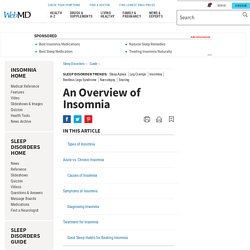
People with insomnia have one or more of the following symptoms: Difficulty falling asleep Waking up often during the night and having trouble going back to sleep Waking up too early in the morning Feeling tired upon waking Types of Insomnia. What Type of Mental Health Professional Is Right for You? By David J. Bridgett, Ph.D., and Michelle M. Lilly, Ph.D., guest contributors Once having decided to seek out help for emotional or behavioral difficulties, the type of mental health professional you choose for treatment can be a difficult decision.
This decision will likely involve your beliefs about the costs and benefits of therapy versus medication. A decision to pursue medication-based treatment alone or in combination with other treatments will put you in contact with a medical professional, such as a psychiatrist. Although your beliefs about treatment type will play a key role in deciding which type of professional to see, other important factors are frequently neglected, including the following. article continues after advertisement. All Social Anxiety Articles on the: Social Anxiety Institute Website. The Social Anxiety Institute is the only treatment center in the world that specializes solely in the treatment of social anxiety. Dr. Thomas A. Richards currently runs all our treatment programs and is a leading clinical authority on the treatment of social anxiety disorder. Dr.
Social Anxiety Disorder Test. Antianxiety drugs fuel the next deadly drug crisis in US. Depression, anxiety, OCD - running helped us beat them. When documentary photographer Martin Eberlen was diagnosed with ADHD in his early 30s, he turned to running to help manage his condition. Martin, pictured below, describes being in a "long-term relationship with running". "Running helps me control my thoughts, it slows me down, and gives me the opportunity to focus on the things I need to focus on," he says. Image copyright Martin Eberlen The photographer wanted to hear stories from other runners, to find out how they had discovered their passion for running, and how the sport relates to previous experiences and their mental health.
After travelling the country to interview and photograph fellow runners, Martin created the photo series Those Who Run. Michelle Bavin Michelle Bavin started running in November 2016, beginning slowly with a couch-to-5km programme. Before running, Michelle had struggled with a "very bad relationship with food" and mental health problems.
With the help of a local support group, she lost nearly nine stone. Is Social Anxiety Getting You Down? by Odhran McCarthy. What to Do When Depression and Anxiety Mix. You've noticed some changes lately. Maybe you feel sad, hopeless, or don’t get any joy out of activities that used to be fun. Sounds like depression, right? Maybe that's not all. Sometimes you're worried, afraid, and just plain uneasy. Isn't that a sign of anxiety? Not so fast. Depression and anxiety are like flip sides of the same coin, says therapist Nancy B. If it turns out that you have both conditions, there are lots of ways to get help.